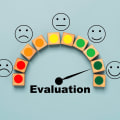In today's fast-paced business world, it is essential for companies to stay ahead of the curve and constantly adapt to the changing needs of their customers. One crucial tool that has proven to be invaluable in this endeavor is a Customer Relationship Management (CRM) system. By implementing a CRM, businesses can not only better manage their interactions with customers, but also gain valuable insights into their needs and preferences. However, before jumping into the implementation process, it is important to first identify and understand the unique business needs that a CRM can address.
In this article, we will delve into the strategies for identifying these needs and how they can be successfully integrated into the implementation and training process. So, whether you are considering implementing a CRM for the first time or looking to revamp your existing system, read on to discover the best practices for identifying and meeting your business needs. The first step in identifying your business needs for a CRM is to assess your current customer relationship management strategies and processes. This involves evaluating your current tools and software, as well as any pain points or areas of improvement within your CRM system. For example, are you struggling with inefficient data entry or lack of user adoption? Are you missing out on important customer insights due to limited analytics capabilities? These are all important factors to consider when determining your business needs for a CRM. One way to assess your current CRM strategies and processes is to conduct a thorough audit.
This may involve reviewing your current data management practices, analyzing your customer communication methods, and evaluating the effectiveness of your sales and marketing processes. By identifying any weaknesses or areas for improvement, you can better understand the specific needs that a CRM system can address for your business. Another important aspect to consider when identifying your business needs for a CRM is the level of customization and flexibility that is required. Every company has unique processes and requirements, so it's crucial to find a CRM solution that can be tailored to your specific needs. This may involve looking for features such as customizable fields, workflows, and reporting capabilities. In addition to assessing your current strategies and processes, it's also important to involve key stakeholders in the decision-making process.
This may include representatives from different departments such as sales, marketing, and customer service. By involving these individuals, you can gain valuable insights into their specific needs and requirements for a CRM system. Once you have identified your business needs for a CRM, the next step is to research and compare different CRM solutions. Look for features that align with your specific needs, as well as user-friendly interfaces and good customer support. It's also important to consider the scalability of a CRM system, as your business needs may change and grow over time. Lastly, it's crucial to integrate your CRM system with other business processes and tools.
This can help streamline workflows and improve overall efficiency. For example, integrating your CRM with your email marketing platform can help you track and analyze customer interactions, while integration with your project management software can improve collaboration and task management. In conclusion, identifying your business needs for a CRM involves a thorough assessment of your current strategies and processes, involving key stakeholders in the decision-making process, and finding a customizable and flexible solution that aligns with your specific needs. By implementing a well-planned and strategic CRM system, you can improve customer relationships, optimize business processes, and drive overall success for your organization.
Utilizing Analytics to Improve Your CRM Strategy
In today's data-driven world, analytics play a crucial role in identifying and meeting your business needs for a CRM. By leveraging the right tools and software, you can gain valuable insights into customer behavior, identify trends and patterns, and make data-backed decisions to improve your overall CRM strategy.Integrating Your CRM with Other Business Processes
To truly optimize your CRM strategy, it is crucial to integrate it with other key business processes.This can include marketing automation, customer support systems, and sales tools. By seamlessly connecting these systems, you can improve data accuracy and streamline workflows, ultimately leading to a better overall customer experience.
Best Practices for Successful Implementation and Training
Once you have selected the right CRM for your business needs, it is important to have a plan in place for successful implementation and training. This involves getting buy-in from key stakeholders, setting clear goals and expectations, and providing comprehensive training for all users. It is also important to continuously monitor and evaluate the effectiveness of your CRM strategy, making adjustments as needed.Choosing the Right CRM Tools and Software
To effectively meet your business needs, it is important to select the right CRM tools and software.This will depend on factors such as your budget, company size, and industry. Some popular options include Salesforce, HubSpot, and Microsoft Dynamics. When evaluating different solutions, be sure to consider features such as data management, customization options, and integrations with other business systems. In conclusion, understanding your unique business needs is essential in identifying the right CRM tools, implementing successful strategies, and integrating your CRM with other business processes. By following best practices and utilizing analytics, you can continuously improve and optimize your CRM strategy for long-term success.



